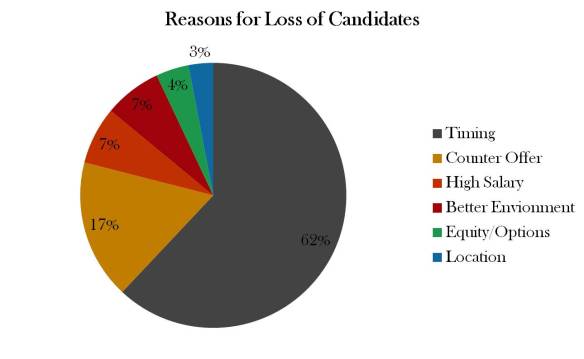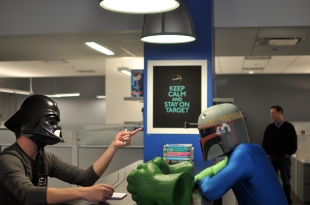GSDer (GˈSˈDˈer)
An individual who gets stuff done quickly, efficiently, and without first being asked or needing his or her hand held.
Wouldn’t it be great if you had time-travel abilities to glimpse into the future—knowing whether your new hire was going to be a self-motivated hustler who consistently gets stuff done?
Instead, many of us do our best at digging into candidate’s professional experience during the interview process, cross our fingers, and hope for the best possible outcome in employee performance.
But luckily, there are a few sure signs that point to the characteristics of a go-getter, hustler, and general GSDer. I sat down with a few GSD executives (who better to identify one than GSDers themselves?) and turned their hard-won experience into an interviewing recipe that will improve your chances of hiring top talent from here on out.
Pre-Screening
Scan for Key Words
It’s a simple fact that proactive people use action verbs and terms when communicating what they can do, both in person and in writing. Look and listen first for “I:” GSDers do things on their own, not as a “we.” Then, watch for action terms like create, produce, influence, accomplish, and lead. If you come across resumes, cover letters, portfolios, and social media profiles with passive or lackluster language (like assist, help, or aid), your non-GSD radar detector should go off. GSDers typically know how to impress on paper—before they even walk through the door.
Look for a Track Record of Success
People who will achieve results on your team have typically already had success before in not just one of their previous positions—but all of them, from internships on up. As Jennifer Fremont-Smith, CEO of Krash and a serial entrepreneur who has hired many GSDers in her day, told me, “I look for people who have an over-developed sense of responsibility—it doesn’t matter what the job is—I’m looking for that person who sees something that needs doing and feels a personal stake in doing it and doing it right, quickly.” In other words, someone whose resume shows a heavy lineup of achievements is likely to make a big impact no matter where he or she is.
Scope Out Extracurricular Activities
GSDers typically don’t sit still—in addition to working, they’re often active in industry organizations, volunteer groups, and more. So do your research, particularly on social media profiles, to check out the interests and activities beyond what someone’s resumes expose. (Of course, it’s quite common for the GSDers to make it really easy for you, and list their activities or affiliations at the bottom of their resume.)
Interviewing
Get Examples
After candidates’ initial screens, ask for samples of their best work. Every over-achiever I’ve ever come across holds a stash of awesome work for safe-keeping—or at the very least will figure out a way to get you something to showcase their abilities. If someone doesn’t have anything to give, or denies the request, you don’t have an action-oriented person on your hands (i.e., not a GSDer).
Ask Digging Questions
Asking the right questions is a great way to uncover a GSDer in your presence! Have a list of behavioral and situational questions, like “What is your biggest professional or personal accomplishment to date?” “Tell me about a time when you created overwhelming value for your company,” and “What professional skill are you most passionate about?” which will dig at what drives someone to do something. If you can’t see someone’s go-getter attitude when asking about things that excite them, you’re not speaking with a GSDer.
Similarly, Candice Olson, founder and co-CEO of The Fullbridge Program and one of the first female leaders to lead an IPO in the U.S., says that “asking questions that lead a candidate to give multiple examples of hitting their goals and how they did it ” is part of the recipe. Olson observes that her “best hires never lack examples of achieving results, and typically even exceeding expectations.” Particularly, she seeks to find the combination of “a positive attitude and someone who will get the job done whenever the call comes.”
Give an In-Person Challenge
In addition to the traditional question-and-answer session, put candidates to the test in-person as part of the formal interview process. For example, for a social media position, have them present for 15 minutes to define a strategy, execution, and tactical plan on how they would increase social media presence for your brand and target audience. Or, if you are more idealistic and culture-centric, have them pick a topic of choice to present on for 30 minutes.
Fremont-Smith has implemented this step at all her companies, “in order to separate the people who can hit the ground running from those who can’t,” she explains. “The highly efficient candidates put in extra effort, think on their feet during this exercise, and come in with a wow factor.” Evaluating the effort and passion people put forth during the exercise will give you a glimpse into what they can really do if they come work with you.
Post-Interview
Pay Attention to Follow-up
If candidates have a real sense of urgency and commitment to your organization, it should be no more than 48 hours before you receive a fantastic follow-up email or creative response. Frankly, anything less is a red flag! What’s more, the response won’t be canned, but instead creative, passionate, and specific to what you discussed. Fremont-Smith mentioned strong, creative, and thoughtful interview follow-up is often a predictor of who will be passionate, motivated GSDers: “The most motivated employees have specific feedback, suggestions and follow-up ideas.”
(Really) Check References
Finally, check three references: two past managers and one peer. Ask them similar questions to ensure you’re getting the same types of response (i.e., that this person hustles). I suggest asking questions around specific projects, time management, delivery of work, and examples of a time the candidate over-exceeded expectations. If you don’t get passionate responses from all references, that should raise another red flag. First of all, GSDers are smart enough not to give you a reference who won’t speak favorably of them—and for the best candidates, their references will rave about them to the point you have to cut the phone call off.
Determining whether or not you’re hiring a GSDer is both art and science, and practice certainly makes perfect. But a good rule of thumb is to look for people who excite and impress you throughout the entire courting process. If they go above and beyond before they’re hired, they’ll likely bring the same attitude once they’re on board.



